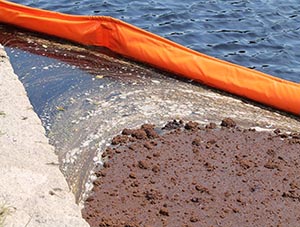By Jeremy Robida
Council Project Manager
 A group of oil spill preparedness planners in Prince William Sound are working together to develop an improved method of training for oil spills. The council has been working for many years to find a suitable oil “surrogate” for spill response training. Surrogates are floating substances such as wood chips, peat moss, or other materials that would mimic an oil slick and have similar interactions with currents, tides, and winds, without harming the environment. A surrogate would provide a target for responders during training and exercises; something which physically interacts with boom and equipment and acts as a visual aid to help responders increase proficiency with gear and tactics.
A group of oil spill preparedness planners in Prince William Sound are working together to develop an improved method of training for oil spills. The council has been working for many years to find a suitable oil “surrogate” for spill response training. Surrogates are floating substances such as wood chips, peat moss, or other materials that would mimic an oil slick and have similar interactions with currents, tides, and winds, without harming the environment. A surrogate would provide a target for responders during training and exercises; something which physically interacts with boom and equipment and acts as a visual aid to help responders increase proficiency with gear and tactics.
Federal policies do not provide guidance for surrogates. Instead, local solutions are encouraged which can be tailored to fit each region’s particular environmental concerns.
The council is facilitating a workgroup to find a surrogate that will work in Prince William Sound. The workgroup is made up of representatives from regulatory agencies, spill response contractors, industry and the council. This workgroup has met several times and reached consensus on certain points, including:
- There is merit in incorporating surrogates into on-water response exercises and training events.
- The group will plan for a surrogate release during a 2016 field exercise, pending approval by regulatory agencies.
- There is no single best surrogate and the group will perhaps test several options.
- This surrogate release will be a small-scale pilot, and could later be scaled up if successful.
The workgroup will design a small exercise similar to other deployments, and seek approval from various agencies. If approved, the group will move forward with the actual deployment. The type of surrogate, how much, and what equipment will be used along with it are still being discussed. Possible surrogates at this point include dog food and coarse wood chips.